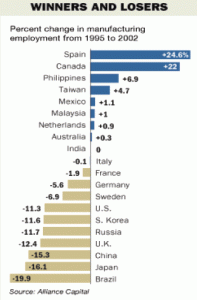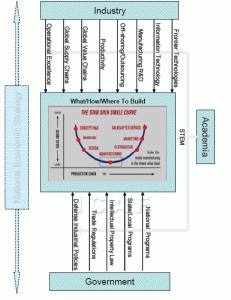By Richard McCormack
For the sake of U.S. national security, the federal government and the Department of Defense must stop ignoring the decline of the U.S. manufacturing sector and put in place policies that reinvigorate American production. That is the recommendation from the 2009 Manufacturing Industry Study conducted by the Industrial College of the Armed Forces (ICAF) at the National Defense University in Washington, D.C. It concluded that U.S. manufacturing is “on the wrong side of an emerging inflection point, from which it may not be able to recover without concerted action.“
The study group found that current U.S. government economic policies are “outdated, poorly coordinated and insufficient for the networked 21st century global marketplace.” Policies remain “steeped in the 20th century, industrially-based, free-market model” that no longer work and are “inappropriate for the needs of today’s economic structure where the combination of products, services, knowledge — and increasingly the policies of other countries — enables specialization and competitive advantage across sectors, especially manufacturing.”
The group calls U.S. economic policies, including environmental regulations, corporate tax laws, monetary and fiscal, “myopic.” Pell Grants, R&D spending and small business development support are only “individual pieces of a system…but fail to secure the system itself,” says the ICAF study group.
The study group “overwhelmingly concluded the U.S. manufacturing industry remains critical to U.S. national power and its vital interests. Furthermore, the Manufacturing Industry Study Group concluded the U.S. can and must achieve these three goals: preeminence, high value-added jobs and innovation.”
It recommends that the U.S. government create a National Economic Strategy that will supplement the existing National Security Strategy, an annual report that has been required by law since 1986. “The process of preparing a National Economic Strategy would more effectively inject the economic instrument of power into the national security planning process,” says the ICAF study group. “This would complement existing efforts to bolster interagency economic policy coordination, such as the creation in 1993 of the National Economic Council alongside the National Security Council.”
The ICAF group says efforts to integrate economic policy into national security planning “are insufficient,” and that other countries are benefiting “from having developed mechanisms which ensure their national economic interests are routinely examined in a wide strategic context….U.S. National Security Strategy documents reveal a heavy focus on the military and political instruments of power with informational and economic instruments included only as supporting elements.”
Economic issues must now be made an integral part of the Quadrennial Defense Review, the National Military Strategy and the National Defense Strategy. “There is no supporting interagency report or process that specifically addresses how national economic policy relates to national security strategy, and this is where preparation of a National Economic Strategy would prove most useful,” says the study group’s report. Such a strategy should be developed across numerous government agencies including Commerce, Treasury, Energy, State, USTR and the EPA. “Creating and vetting such a document would impose a discipline of interaction across economic-focused government departments and expand communications channels among these departments, other non-economic civilian entities in government, and the military.”
This National Economic Strategy should address the issues impacting the U.S. manufacturing sector and the defense industrial base. It needs to consider policies that improve the U.S. balance of trade, and it should re-examine trade policies to create a level playing field for U.S. industry. The strategy should also promote policies that ensure the United States captures the economic benefit of developing “frontier” technologies and industries such as nanotechnology, biotechnology and environmental goods.
An NES Will Integrate Key Characteristics of the Manufacturing Industry
(Credit: NDU Study, page 10)
The ICAF manufacturing group recommends that governments at all levels in the United States work together to create policies and target resources and initiatives to support all manufacturing activities through R&D, product design, production, maintenance and administrative functions such as purchasing, inventory control and shipping. “Manufacturing jobs are particularly beneficial to the communities in which they are located and the creation and retention of such jobs often rests on the ability of governments, universities and corporations to coordinate activities that support the process of turning research and ideas into domestically produced goods.” North Carolina’s Research Triangle Park should be used as a model for governments working with industry and universities to create manufacturing clusters that generate wealth and good jobs for local communities.
Finally, the NDU study group says there needs to be an independent panel that reviews the impact of taxes and regulations on domestic manufacturers. “The current combined corporate tax rate of 39.3 percent is a poor advertisement for investment into the U.S. economy,” according to the study group’s recommendation. “An overhaul of the tax code to incentivize domestic R&D and production may be necessary to retain the industrial base.”
The Manufacturing Industry Study Group says that the United States can turn the situation around, “but only through concerted action…and it is imperative this action begins now.”
***
This article is featured in this week’s Manufacturing News at: http://www.manufacturingnews.com/news/09/1117/ICAF.html
———-
***Posted November 23rd, 2009



